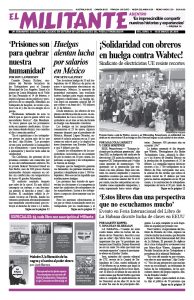Washington announced March 1 the Pentagon is ending permanently the large-scale annual war “games” involving tens of thousands of troops it has organized in Korea for decades.
“The decision to permanently halt the Key Resolve and Foal Eagle war exercises should be celebrated by working people everywhere,” said Seth Galinsky, Socialist Workers Party candidate for New York City Public Advocate, March 6. “They carried the constant threat of war on the Korean Peninsula and were a barrier to denuclearization.
“The SWP has campaigned for a halt to these military provocations from their start. The move to end them creates better conditions for workers and farmers in Korea, Asia and around the world to advance their interests,” Galinsky added. “Now is the time to redouble our efforts to end the punishing U.S. economic sanctions on North Korea.”
The cancellation of the inflammatory exercises follows the North Korean government’s suspension of nuclear and ballistic weapons tests.
The U.S. government says it also plans to scale back or cancel smaller military exercises it holds in Korea. President Donald Trump has admitted that the military exercises were “provocative.”
The announcement came just days after a two-day summit between President Trump and North Korean leader Kim Jong Un in Hanoi, Vietnam. The meeting ended Feb. 28 without an agreement.
Negotiations are continuing. Secretary of State Michael Pompeo told the press March 4 that he hoped Washington would send another delegation to Pyongyang in the next few weeks.
North Korean officials said that they offered to destroy the Yongbyon nuclear weapons facility in exchange for lifting some of the sanctions, but that Washington expected more.
‘End all U.S. sanctions!’
The ending of the war exercises can be used to strengthen the fight against the U.S. economic, financial and commercial sanctions on North Korea. The sanctions have accelerated a decline in the country’s exports, increasing shortages and worsening the conditions facing millions of working people there.
The U.S. rulers have based tens of thousands of troops in South Korea since first dividing the country in two after World War II. They installed the Syngman Rhee dictatorship there and drowned a series of uprisings by workers and farmers in blood. During the 1950-53 Korean War, U.S.-led forces used carpet bombing and napalm, and over 4 million people were killed. Entire cities were leveled. It was the first time the U.S. rulers lost a war, and they have refused ever since to sign a treaty ending it. There are still some 28,500 U.S. troops in South Korea today.
Successive U.S. administrations, Democratic and Republican, have maintained Washington’s political and military domination of South Korea. They’ve deployed nuclear weapons in South Korea for 33 years, from 1958 until 1991, and deploy nuclear-capable ships and planes in the region.
Since 2006, when Pyongyang tested its first nuclear weapon, Washington has orchestrated 11 rounds of sanctions on North Korea, including through the United Nations.
After the Hanoi summit the South Korean government said it would take up Trump’s request to continue talks with DPRK officials. They are on board with Washington’s decision to end the massive annual war exercises.
To advance their discussions with the DPRK, the South Korean government looks to initiate joint economic projects with North Korea with Washington’s approval, despite continuing U.S. sanctions. Seoul has discussed a common rail network with the North and would like to reopen a joint industrial park in Kaesong, North Korea.
Ending the sanctions would accelerate this process further and open more opportunities for workers and farmers to fight to end the division of Korea.
Liberal opponents of President Trump screamed that the latest summit was a disaster. In its Feb. 28 issue, the New York Times editors charged that Trump’s “fawning over dictators like Mr. Kim continues to erode the moral foundation that for generations has supported American diplomacy.” They quote unnamed CIA sources prophesizing that North Korea will never give up its nuclear weapons.
But the momentum from the Pentagon announcement presages further progress. An agreement that rids the entire Korean Peninsula of nuclear weapons would be welcomed by working people there and around the world.
The U.S. propertied rulers maintain a massive nuclear arsenal of some 6,450 warheads. The only time nuclear weapons have ever been used is when Washington bombed the Japanese cities of Hiroshima and Nagasaki in 1945, annihilating some 100,000 people in Hiroshima alone. Steps to eradicate these weapons are in the interests of all working people.
Trump has told Kim he supports making an end-of-war declaration, which could lead to formally announcing the end of the Korean War — a key demand of Pyongyang — but has not yet done so.
“We should demand the U.S. government immediately sign a peace treaty ending the war against the Korean people,” Galinsky said, “on top of ending their sanctions.”

